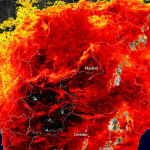While most women without health problems can safely exercise during pregnancy, doctors discourage workouts in hot weather because it can lead to heat stress and dehydration. Physicians also advise women to avoid saunas and hot tubs because these activities can raise the body temperature and increase the risk of birth defects.
The risks of heat exposure from warm weather exercise, saunas and hot tubs are thought to develop when the internal body temperature reaches at least 39 degrees Celsius (102.2 degrees Fahrenheit), researchers note in the British Journal of Sports Medicine.
For the current study, researchers examined body temperature data from 12 previously published studies of 347 pregnant women who exercised outside during hot weather, took hot baths or used saunas or hot tubs. They found no evidence that any of these activities raised the body temperature to 39 degrees Celsius.
“Presumably people have been told to avoid exercise in hot weather and sauna and hot bath exposures because of concerns about reaching this critical threshold,” said senior study author Ollie Jay of the University of Sydney in Australia.
“It is very difficult to get that hot – most people do not realize that,” Jay said in an email. Across all of the smaller studies in the analysis, the highest temperature reported for any woman was 38.9 degrees Celsius, and that was immediately after exercise. Warm weather workouts were also associated with the highest average temperature across all of the studies, at 38.3 degrees Celsius.
By comparison, the highest average temperature after a hot bath was 36.9 degrees Celsius, while the highest average temperature after time in a sauna was 37.6 degrees Celsius.
Based on these results, the researchers conclude that pregnant women can safely engage in up to 35 minutes of high intensity aerobic exercise at outdoor temperatures of up to 25 degrees Celsius (77 degrees Fahrenheit).
These results also suggest that pregnant women may spend up to 20 minutes in a bath heated up to 40 degrees Celsius (104 Fahrenheit) or a sauna heated to 70 degrees Celsius (158 Fahrenheit), the authors write.
Beyond its small size, other limitations of the analysis include the varied designs and goals of the smaller studies it examined, which made it difficult to rule out the possibility that some factors that were not measured might have impacted the results, the authors note.
The study also wasn’t a controlled experiment designed to prove whether saunas, hot baths or warm weather workouts are safe for mothers or babies, or what duration or intensity of activity might be safest.
It’s too soon to change current recommendations against these activities for pregnant women, said Dr. Juma Rahman, a researcher at the University of Auckland in New Zealand who wasn’t involved in the study.
Beyond heat stress, the risks can include less oxygen reaching the uterus and baby, Rahman said by email. Women with certain medical conditions like anemia, carrying twins or other obstetric complications may also have an increased risk of heat-related health problems during pregnancy.
Still, pregnant women shouldn’t avoid exercise. Among other things, it can help lower the risk of elevated blood pressure or diabetes during pregnancy, help women avoid gaining too much weight and strengthen abdominal and pelvic muscles.
“There are heaps of benefits,” Rahman said.













